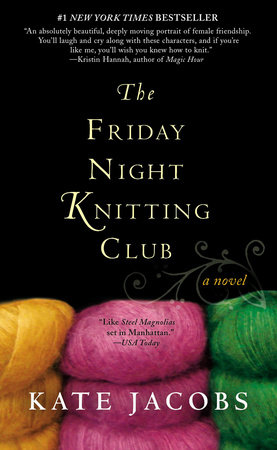READERS GUIDE
Questions and Topics for Discussion
INTRODUCTION
The Friday Night Knitting Club
Georgia Walker is a single mom and successful New York City entrepreneur whose yarn shop, Walker and Daughter, has become something of a mecca for knitters of all skill levels and dispositions. What begins as a disorganized Friday night gathering of her most loyal customers turns into a regular meeting of minds and hearts, as each woman discovers there’s much more to be found at Walker and Daughter than tips on knitting technique. Just when business is really looking up, the father of Georgia’s daughter and a long-forgotten nemesis suddenly resurface and Georgia’s orderly world falls to pieces. Soon enough, she learns that she isn’t the only Friday Night Knitting Club member who sees it as the only constant in life, and a saving grace at that.
ABOUT KATE JACOBSKate Jacobs is a writer and editor who divides her time between New York and Los Angeles. A former staffer at Redbook, Working Woman, and Family Life, she is now a freelance editor at the website forLifetime Television. The Friday Night Knitting Club is her first novel.
DISCUSSION QUESTIONSWhy does Georgia reject her parents’ offer to house her and Dakota?The role of friendships among women is a central theme of The Friday Night Knitting Club. Some friendships develop easily, like K.C. and Georgia’s, while others begin on unsure footing, like Darwin and Lucie’s. Cat’s insecurities create conflicted feelings about drawing Georgia closer. Discuss the emotional baggage and issues of class that challenge trust between various women in the knitting club.Georgia has a history of being burned by the people closest to her. Cat’s decision to attend Dartmouth meant breaking a pact of friendship, and James abandoned her for another woman. Leading up to forgiveness, do you think there are moments when her defenses against intimacy and protectiveness of Dakota are excessive?What does Anita see in Georgia that gives her the confidence to invest? Why does Georgia trust Anita, given her past relationships that went awry?Lucie’s decision to become pregnant without telling the man she conceives with is a choice that flies in the face of social convention and her mother’s expectations, to say nothing of her Catholic upbringing. What factors led to her choice? How does the whole of Georgia’s experience as a single mother support or undermine her decision?Entrepreneurs, single moms, and a seventy-something undergoing a sexual reawakening—the women of the knitting club are hardly traditional, although a highly traditional woman’s craft is what brings them together each Friday. Eventually Darwin decides to write her thesis about the positive impact of knitting in the lives of modern women rather than criticizing it as a “throwback” that prevents women from focusing their energy on professional success. In your opinion, which is the more feminist interpretation?Georgia gets defensive when James asserts that he has things to teach Dakota about race that Georgia could never teach her. Is her indignation totally justified in light of James’s delinquency as a father, or is there some truth to his claim?How does Dakota’s major act of rebellion (her attempt to go to Baltimore) alter Georgia and James’s playing field? Do you agree with Georgia’s decision on an initial trip to Scotland over a trip to Baltimore?Before Georgia gives James a second chance, she claims to harbor “hatred lite” toward him, reasoning that she’d always heard the opposite of love is hate. When Cat’s lawyer informs her that Adam wants to settle and be done with her, she’s unexpectedly hurt because he’s letting her walk away without a fight. Given Cat’s reaction, how does indifference factor into the love/hate equation?When Cat responds to Georgia’s sincere questions about her college experience at Dartmouth by saying, “It wasn’t like you think,” what does she mean?Things get interesting in Scotland when Georgia’s Gran offers her loving but firm analysis of the women’s lives. She points out that Cat is capable of handling stress but hasn’t tried, and that Georgia’s spent too much time ruminating on the past. Her advice: mistakes are made; the important thing is to decide how to react to what people offer, because you can’t make them change. How do the women accept this advice in each of their lives?If Georgia had opened the letters she received from James in a timely fashion, how might things have been different?While James and Dakota are in Baltimore visiting his parents, Georgia decides to tell the club that she has cancer. Why does she share her news with the knitting club before she tells her immediate family?When Georgia gets diagnosed, she worries that a show of weakness will be unacceptable to Dakota, James, and others who know and love her as a pillar of strength. How do her loved ones prove her wrong?In your opinion what is the main lesson of The Friday Night Knitting Club?

